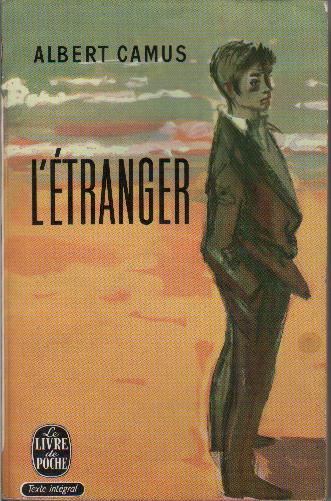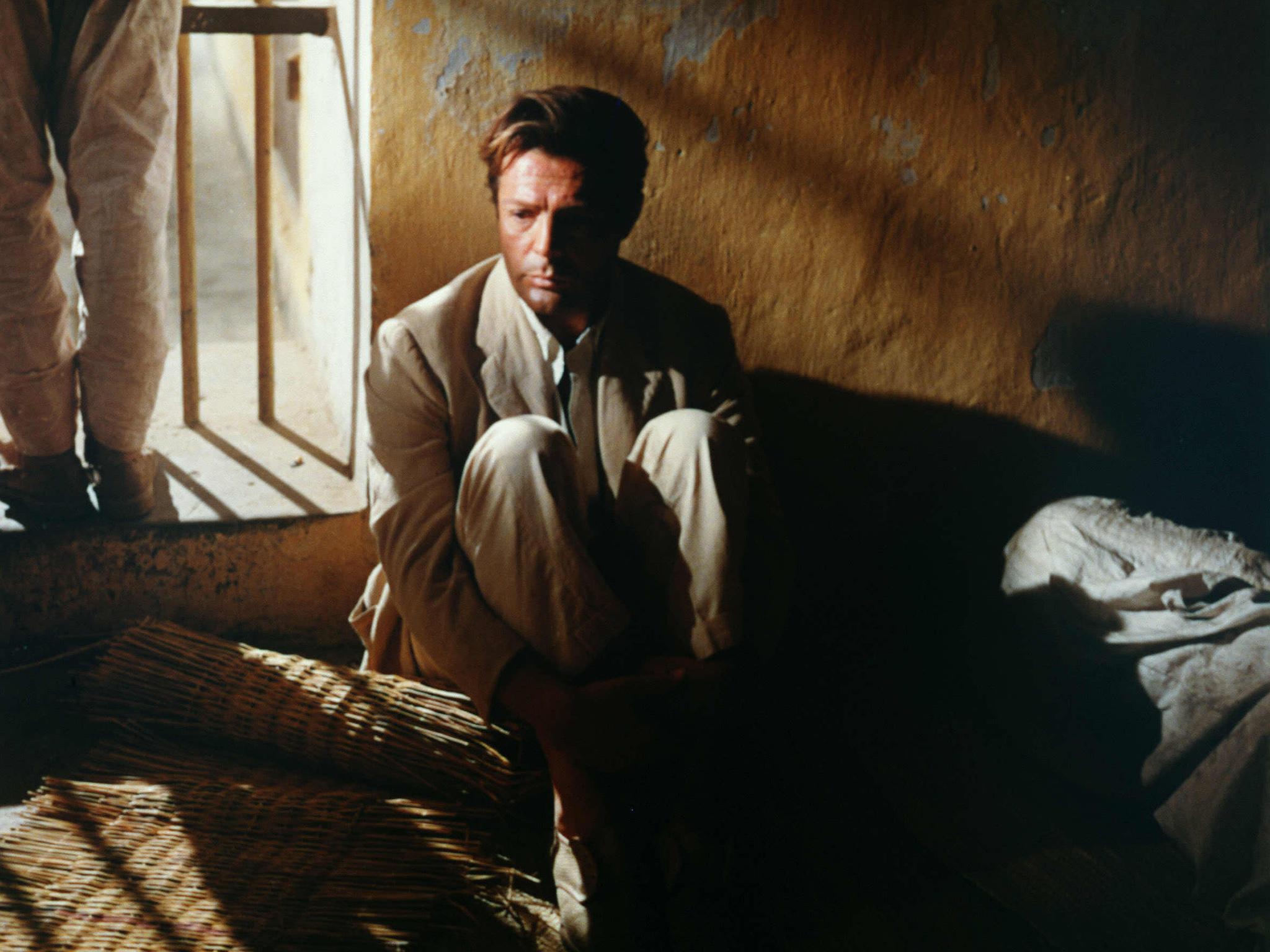Will the real outsiders please stand up. I tip my hat to you, the nameless
The most stolen book from Foyles by teenage boys is The Outsider by Albert Camus. Andy Martin explains why that might be and looks at what it means to be an outsider in today's society

Your support helps us to tell the story
From reproductive rights to climate change to Big Tech, The Independent is on the ground when the story is developing. Whether it's investigating the financials of Elon Musk's pro-Trump PAC or producing our latest documentary, 'The A Word', which shines a light on the American women fighting for reproductive rights, we know how important it is to parse out the facts from the messaging.
At such a critical moment in US history, we need reporters on the ground. Your donation allows us to keep sending journalists to speak to both sides of the story.
The Independent is trusted by Americans across the entire political spectrum. And unlike many other quality news outlets, we choose not to lock Americans out of our reporting and analysis with paywalls. We believe quality journalism should be available to everyone, paid for by those who can afford it.
Your support makes all the difference.“Do you want to know what the most stolen book is? ” This from a guy at Foyles bookshop on Charing Cross Road. “Particularly among 15- or 16-year old boys. ” Obviously I wanted to know. You may be wondering, though, why he was even asking me this question in the first place. And you would be right to infer that (a) I was once a 15- or 16-year old boy and (b) to my everlasting shame I once stole a book from a bookshop – specifically, Sartre’s Being and Nothingness. My only reasonable excuse is that the book made me do it. And it was in French. And I did ultimately pay for it (just not in actual cash as such). Anyway, it turns out that this weighty tome is not the most popular covetable work. The surprising thing is that it is not the Kama Sutra or some more contemporary equivalent either. The most stolen book among delinquent teenage literati is in fact The Outsider, by Albert Camus.
For starters it is a slim paperback in the English edition (with a new Penguin translation, moreover, by Sandra Smith). Therefore, eminently nickable, which was not as true of the Sartre, which required the hidden depths of a herringbone overcoat. The Outsider (originally L’Etranger, known as The Stranger in the US, first published in 1942) is a mere 30-something-thousand words long. A short novel. But there are other slim paperbacks crying out to be stolen. So it’s nothing to do with size. The thing about The Outsider is that it is one of the greatest short novels ever written. A manifesto of coolness (or “Degree Zero” writing as Roland Barthes called its stylistic minimalism and lack of affect). A hymn to sex, death, and swimming. And an exploration of what it feels like to be alive, in an alienated, anomic way. But I would add one more consideration, which is this: it is 100 per cent wrong in its claims to outsider status.
At least, it is now. Maybe it always was. The hero Meursault is a white man, brought up as a Catholic, born in Algeria (as Camus was), then a French colony (or, technically, a “département” of France). So, admittedly, fairly weird. But to my way of thinking no white guy can really stake a claim to being the true outsider. Least of all President Trump, for all his pseudo-anti-establishment bluster. Or former president George Bush, who at least apparently read The Outsider. White guys are part of the global patriarchy club. The Arab that Meursault shoots on the beach, leading to imprisonment and trial in the second part of the book, would perhaps have a more valid claim, on the grounds of being anonymous and one of the colonised (Kamel Daoud’s The Meursault Investigation finally confers a name upon him, “Musa”).

If you were to re-write The Outsider today rather than lifting a copy of the original, the hero would have to be a woman, since she would not therefore belong to the massive gentlemen’s club that is the world. And she would have to be a lapsed Muslim, since she would then be a fugitive from the highly normative, repressive and protocol-obsessed system that is organised religion. And she could be a lesbian, but that seems to me optional. Maybe bisexual, or transitioning, I haven’t made up my mind about that. I don’t want to tell her how to conduct her love life.
While I was at it – this renovation of the creaking Camusian architecture – I would almost certainly make it a little more thrilling. This is the other thing about The Outsider. In the age of The Girl with the Dragon Tattoo and Jack Reacher, it reads like a thriller manqué. It lacks a third act. I mean, take that prison sequence, for example. So Meursault just sits there talking philosophy or theology or exchanging absurdist remarks. Come on, Albert! It’s a prison, not a seminary. Where are the sex and drugs and violence?
Back in the real world I’ve met one or two of the New Outsiders. I know an American drop-out ex-Muslim who now describes herself as “nothing”. And I thought Elif Shafak, the Turkish author, struck a similar note when I heard her speak at the LSE recently. Surrounded by sectarian believers, she is a secularist who loathes and detests tribalism. But the most articulate New Outsider I have yet come across is a British/Afghan woman by the name of Mohadesa. I had a conversation with her at the British Library, over a cup of tea. I think she deserves attention because although we know all about the “lapsed Catholic” and so on, the very idea of a lapsed female Muslim is apt to seem like an oxymoron. It isn’t. Or if it is, Mohadesa is a living oxymoron.

She was born in Afghanistan but brought up in England by refugee parents fleeing conflict. Her first language was Farsi and she studied the Koran in Arabic. She is now in her twenties, lives in London and the Netherlands, and is in open revolt against everything her family and religion and background stand for. Meursault – to go back to Camus – is indifferent when his girlfriend suggests they get married, doesn’t care one way or the other, and when she asks if he really loves her, he replies that “that didn’t mean anything but doubtless he didn’t.” Marie is perturbed, but they still have a lot of sex. Mohadesa is more Meursault than Marie. In fact, she is more articulate than old Meursault. “There are three things I value and cherish the most, ” she said. “1. Sex; 2. Not believing in God; 3. Being outspoken.” One of her close relatives was a virgin when she married. “Sex is one of the biggest pleasures. Why would you refuse that? ”
Meursault in jail agrees to see the chaplain. But gets sick of the guy trying to convert him. And in the end cracks up when the chaplain promises to pray for his soul. “None of his certitudes was worth a single strand of a woman’s hair. ” Mohadesa, similarly, has become a militant atheist. She was brought up within Islam, her parents are Shia, her sister is Sunni. She had an “epiphany” aged 16 when a Somali friend said to her, “So this Allah of yours – if he is so wonderful and benevolent and all that, how comes he needs you to pay homage to him five times a day? Isn’t that rather arrogant and selfish? ” The 16-year old Mohadesa was outraged and spluttered and remonstrated (“How dare you blah blah! ”) but her friend had planted a seed. To the great consternation of her family, she stopped praying to “the celestial dictator”. Then she read the Stoics and Richard Dawkins and Christopher Hitchens. “Now I worship Hitchens,” she said.
Meursault attends the funeral of his mother. The classic opening line of The Outsider is, “Today, Maman died. Or perhaps yesterday, I don’t know. ” Good line, and he still gets punished for not seeming to care quite enough about his poor old Ma. In my hypothetical New Outsider novel, with a young female protagonist, possibly called “Nada” (with a nod in the direction of Carmen Laforet’s 1945 novel) of course it’s her father who has to die. And personally I reckon, in the best thriller tradition, she would have to kill him. It’s more thriller, more noir. Let me stress, Mohadesa has killed no one. But she scorns and rejects her cultural heritage. Her family naturally believe that she has been possessed by the devil, or a “demon”, but still hope she will get married, which will save her. “Afghan women get married at 18 and they’re treated as chattels. Why would I be enthusiastic about that? ”
She once got involved in a fight at Kabul airport when some guys were hassling a woman. Mohadesa was wearing the headscarf and the guys were shocked and outraged that she would stick her oar in. “Men are terrified of me,” she said. Mohadesa is writing a book about how you can re-train your brain or “transform your neural programming”. In 90 days. It’s a mix of existentialism, Buddhism, neuroscience, with a dash of cultural anthropology, and hints of Kahlil Gibran, all anchored in her personal experience. She calls it “a technology for living”. Another way of giving the status quo a good kicking. She embraces “willing ignorance”, “shamelessness”, “non-dualism”, and a Rimbaud-like “disordering of perception”. And she wants to make speeches like Colonel Gaddafi.
“If you want to hate me in five minutes, that’s fine by me,” she said. “I don't want anybody liking me.” I like that.

I feel, in order to be correct and fair, after all this putting the boot into religion, I should say that, of course, I respect Islam and all other faith-based systems. The fact is I don’t. The word “respect” is practically devoid of meaning so I try to avoid it as much as possible. If anyone says, “with respect”, we all know they are lying, so why bother? “Yours respectfully". Cobblers. True outsiders lack respect. Just for a change I want to tip the hat to all those who don’t normally get the hat-tip, because they don’t have a name. The nameless. The vast network of those who do not have a network. The category of those who do not belong to any category. They are the unclassified and unclassifiable. They acknowledge no god and no religion and no nation. They don’t want to belong to any club that will have them as a member. They are the outsiders of today. “I’m inexplicable,” as Mohadesa puts it.
She likes to use the rather cool word “noneity” (unknown to me, I admit) – the opposite of all those who sign up to an identity, or fully subscribe to all those forms you have to fill in or Facebook profiles or ticking the boxes in the passport application. The dark matter of our world, vast and mysterious. Whoever does not fit in a box. Meursault maybe, Mohadesa definitely. And you who, at certain times in certain moods on certain days, who start to doubt who you are and where you really belong and whether the job you are in, or the religion, or the marriage, or the country, are really the perfect fit for you after all. And that, I suspect, is simply everyone.
By the way, the Foyles guy told me that they let off the up-and-coming outsiders who want to steal The Outsider with a gentle warning, if they catch them. It’s a benevolent tradition. “At least they’re readers,” he said. “We don’t want to lose them.”
Andy Martin is the author of “Reacher Said Nothing: Lee Child and the Making of Make Me” (Bantam Press, RRP £18. 99). And the forthcoming existentialist thriller, “Nada”. He teaches at the University of Cambridge. Follow him @andymartinink
Join our commenting forum
Join thought-provoking conversations, follow other Independent readers and see their replies
Comments